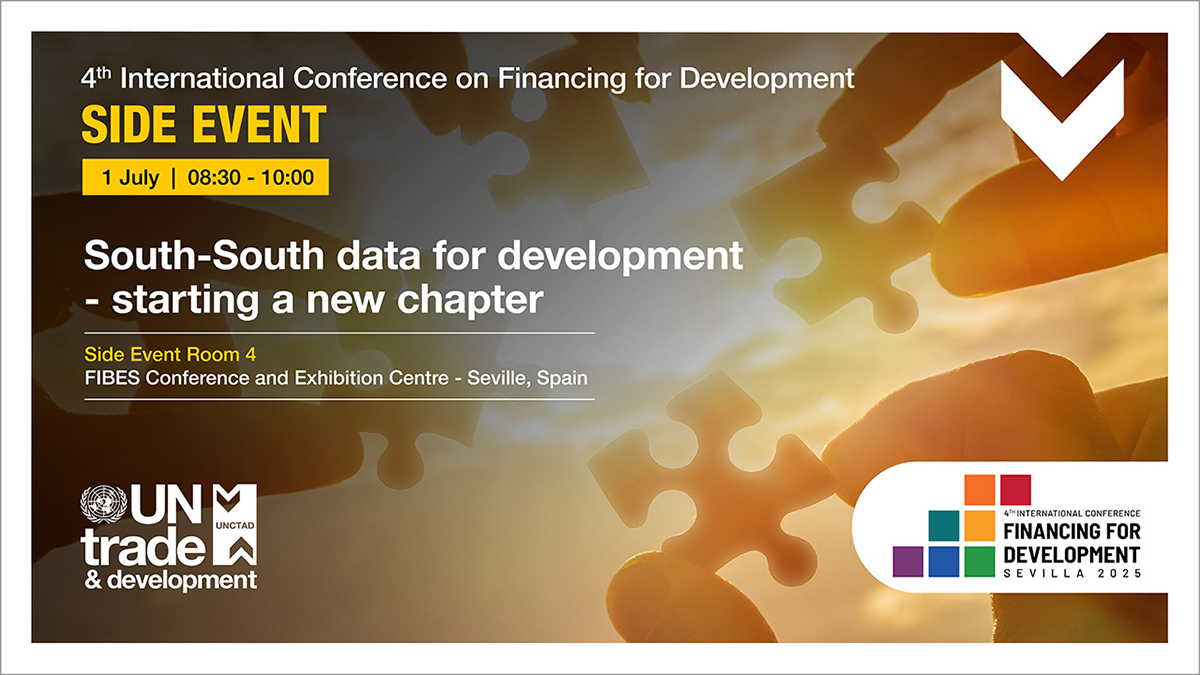
As leaders gather in Sevilla, momentum is growing to measure South-South cooperation (SSC) more systematically. This follows the historic 2022 endorsement of SDG indicator 17.3.1 by the UN Statistical Commission, which welcomed the voluntary Conceptual Framework to Measure South-South Cooperation developed by countries of the global South to reflect their development realities.
In response, UNCTAD was designated as custodian of SSC data under this indicator, while TOSSD (hosted by the OECD) continues to track North-South flows. Together, these efforts offer a unique opportunity to deliver globally inclusive data on development cooperation.
In 2024, over 60 countries expressed interest in using the UN Framework to report SSC data. A subsequent inter-regional expert meeting in Doha brought together 66 countries to share experiences and build momentum. The draft outcome of the Fourth International Conference on Financing for Development (FfD4) encourages broader reporting of South-South cooperation data.
For too long, South-South cooperation remained the only major form of development support not systematically measured—limiting its visibility and strategic use. The UN Framework now enables countries to report SSC data on their own terms, complementing traditional North-South data.
To support implementation, UNCTAD launched a global project in 2023 with the UN Regional Commissions and UNOSSC. Pilot countries are now collecting data using a practical manual released in 2025, which guides institutional arrangements for data collection, analysis, and reporting.
This year, four countries submitted the first official SSC data to UNCTAD. These highlight the value of non-financial contributions—such as scholarships, humanitarian aid, and technical cooperation—across key SDGs including education (SDG 4), health (SDG 3), food security (SDG 2), peace and justice (SDG 16), and partnerships (SDG 17).
Why measure South-South cooperation?
Because data provides critical insights into mutual support among developing countries. It helps allocate resources more effectively, strengthens regional resilience, and fosters solidarity. Robust national data systems also empower countries to align cooperation with their priorities, track activities, and present evidence-based positions in global forums.
Objective
This session discusses the first South-South data and guidance to enable such data to be collected in all interested countries using the UN Framework. It will feature insights from experts and pilot countries, highlight tools and resources developed, and explore how data can elevate the voice and visibility of the global South in development cooperation.
The UN Statistical Commission tasked UNCTAD with supporting member States in testing the UN Framework, building capacity, and enabling global reporting of South-South data. In 2023, UNCTAD launched a global project for its testing with the UN Regional Commissions and the UN Office for South-South Cooperation (UNOSSC), and pilot countries are now collecting data guided by a practical manual released in 2025, which outlines how to strengthen institutional arrangements to collect, analyse, and report South-South data.
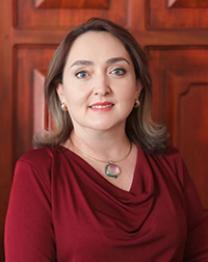
Cristina Camacho is a career member of the Ecuadorian Foreign Service with the rank of Minister. Prior to her appointment as Undersecretary for International Cooperation, she served at the Embassy of Ecuador in Washington, the Embassy of Ecuador in Peru, and Ecuador’s Mission to the European Union in Brussels. Additionally, she held the positions of Acting Undersecretary for Multilateral Affairs and Director of the Inter-American System.
In the multilateral sphere, Minister Camacho serves as Chair of the Global Forum on Cyber Expertise (GFCE) Foundation Board, a global platform dedicated to strengthening cybersecurity capacities worldwide. Her expertise in this field has positioned her as a key facilitator in promoting international cooperation to address the challenges of the digital environment.
During her tenure as Head of Cooperation at Ecuador’s Mission to the European Union, she led collaborative initiatives with the European Union, the Council of Europe, governments, and international agencies, significantly contributing to Ecuador’s resilience against various security challenges.
Minister Camacho is a strong advocate for the importance of public-private partnerships and the development of a new era of international cooperation, integrating diverse stakeholders and fostering meaningful, high-impact connections. Her experience and leadership have enabled Ecuador to establish itself as a relevant player in the fields of cybersecurity and international cooperation.
Minister Camacho earned a Bachelor's degree in Applied Languages to International Relations from Pontificia Universidad Católica del Ecuador, a Master’s degree in International Public Policy from The Johns Hopkins University, and a Diploma in International Relations from the Latin American Faculty of Social Sciences (FLACSO).
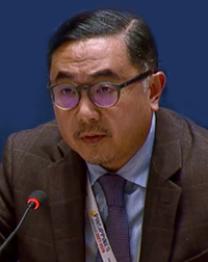
Mr. Jesus Enrique Garcia is Minister at the Permanent Mission of the Philippines, with over 20 years’ experience as a diplomat.
He was one of the Group of 77 and China’s Coordinators for the 4th International Conference on Financing for Development.
Last year, he negotiated the Global Digital Compact adopted at the Summit of the Future, resolutions on “ICTs for Sustainable Development” and “International Migration and Development,” and facilitated “Implementation of the Third UN Decade for the Eradication of Poverty.”
He led processes on governance, human rights and climate change, combatting trafficking in persons, and World Heritage, during postings at the United Nations in Geneva and UNESCO in Paris.
In Manila, as Deputy Assistant Secretary for the UN and International Organizations, he contributed to the Philippines’ UN Sustainable Development Cooperation Framework (2024-2028) and UN Joint Program on Human Rights.
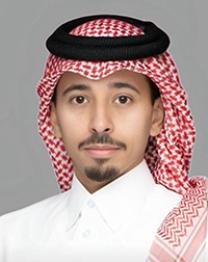
H.E. Sultan Ahmad Al-Aseeri is the Director of International Cooperation Department in the Ministry of Foreign Affairs of the State. He is a prominent Qatari development leader with extensive experience in international development, humanitarian efforts, and foreign policy.
He has previously served as the Director of Qatar Fund for Development (QFFD), and he is key figure in Qatar's global outreach and commitment to sustainable development.
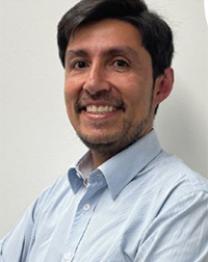
Mr. Daniel Rodriguez is a professional in Government and International Relations from the Externado University of Colombia, with a specialization in Political Marketing from the Pontificia Universidad Javeriana of Bogotá.
He worked as a Specialist in Assistance and Databases for the Program for the Prevention and Assistance to Victims of Human Trafficking of the Colombia Mission of the International Organization for Migration (IOM).
For nine years, he was responsible for coordinating International Relations and International Cooperation at the National Administrative Department of Statistics (DANE).
He was part of the Cooperation team at the National Planning Department (DNP) and served as Coordinator of Institutional Alliances at the Center for Strategic International Thinking (CEPEI).
He joined the Presidential Agency for International Cooperation (APC Colombia) in 2018, serving as Coordinator for Latin America and the Caribbean. In March 2023, he assumed the role of Director of the Directorate of South South Cooperation.
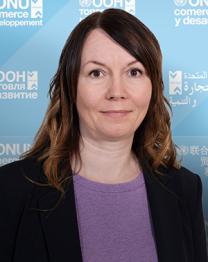
Anu Peltola is the Director of UNCTAD Statistics, Data and Digital Service overseeing the statistical, digital transformation and information technology work of the UN Trade and Development. She supports countries in measuring Sustainable Development Goals (SDG) indicators on trade, maritime transport, investment, illicit finance, South-South cooperation, and enterprise sustainability. Anu brings over 25 years of experience in official statistics at both the national and international levels.
She serves as the UNCTAD Chief Statistician coordinating internal, UN system-wide and international statistical and data efforts, including initiatives such as beyond GDP and the cost of SDG transitions. She is the co-chair of the UN system Chief Statisticians (CCS-UN) and the Committee for the Coordination of international Statistical Activities (CCSA) consisting of 45 international organizations. Her team also contributes to the development of new statistics and methodologies and supports UNCTAD programs in creating and delivering innovative, AI-assisted data management platforms for diverse domains such as non-tariff measures, informal cross-border trade, international investment policies, laws and regulations. It helps enhance countries' statistical capacity in measuring trade and development, for instance through the Trade-in-Services Statistics information system (TiSSTAT), a modern tool for national statistical authorities, as well as through a new set of indicators on gender equality in trade and the inclusive growth index (IGI). UNCTAD's statistics are released in UNCTAD Data Hub and Data Insights always reflecting the latest data in UNCTADStat and SDG Pulse sharing the latest data-driven analysis.
Before joining UNCTAD, Anu was engaged in preparing Chief Statisticians’ meetings under the Conference of European Statisticians in UNECE and coordinated international efforts to develop guidance for instance on modernising statistical legislation and enhancing the value of official statistics. She established a new joint work stream for climate and statistical communities. Previously, she worked in Statistics Finland serving as Head of Statistics and Head of Development in short-term economic, business and household statistics.
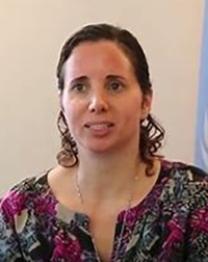
Ms. Ines Tofalo, Trust Fund and Project Management Specialist at the UN Office for South-South Cooperation (UNOSSC) coordinates the portfolio of South-South Trust Funds and Programmes that is implemented through the United Nations System for the benefit of developing countries. Namely, she manages the UN Fund for South-South Cooperation (UNFSSC) established through a UN General Assembly resolution; the India, Brazil and South Africa Facility for Poverty and Hunger Alleviation (IBSA Fund) spearheaded by these three countries that prioritizes support to Least Developed Countries and Small Island Developing States; the India-UN Development Partnership Fund (India-UN Fund) which is a $150 million financing mechanism; and the Perez-Guerrero Trust Fund (PGTF) of the Group of 77. Her portfolio also includes projects directly implemented by UNOSSC within these facilities, with the largest ones being the partnership with China P.R.C. facilitating South-South networks and City-to-City sharing, and the Triangular cooperation facility by the Republic of Korea supporting the lower Mekong river basin.
Ines has worked mostly on South-South cooperation since 2007, initially at UNDP, through secondments to FAO and UNESCO, and largely at UNOSSC. Previously, she has also worked as a private sector finance attorney, for the World Bank, UN Women, the UN Secretariat and the NGO Doctors of the World. She holds a Juris Doctor from New York University School of Law.


